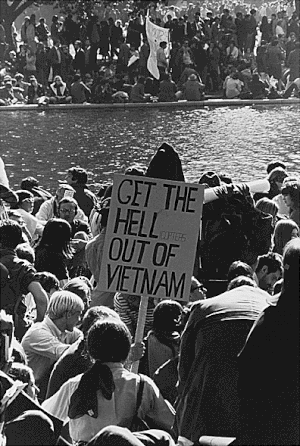Opposing the Vietnam war
| Opposition to United States involvement in the Vietnam War | |
|---|---|
| Part of the Anti-war movement | |

Protests against the Vietnam War in Washington, D.C., on October 21, 1967
|
|
| Date | 1964–1973 |
| Caused by | United States Involvement in the Vietnam War |
| Goals | End the U.S. presence in the Vietnam War |
| Resulted in |
|
Opposition to United States involvement in the Vietnam War began with demonstrations in 1964 against the escalating role of the U.S. military in the Vietnam War and grew into a broad social movement over the ensuing several years. This movement informed and helped shape the vigorous and polarizing debate, primarily in the United States, during the second half of the 1960s and early 1970s on how to end the war.
Many in the peace movement within the U.S. were students, mothers, or anti-establishment hippies. Opposition grew with participation by the African-American civil rights, women's liberation, and Chicano movements, and sectors of organized labor. Additional involvement came from many other groups, including educators, clergy, academics, journalists, lawyers, physicians (such as Benjamin Spock), and military veterans. Their actions consisted mainly of peaceful, nonviolent events; few events were deliberately provocative and violent. In some cases, police used violent tactics against peaceful demonstrators. By 1967, according to Gallup Polls, an increasing majority of Americans considered US military involvement in Vietnam to be a mistake, echoed decades later by the then head of American war planning, former U.S. Secretary of Defense Robert McNamara.
The draft, a system of conscription which threatened lower class and middle class registrants drove much of the protest after 1965. Conscientious objectors did play an active role although their numbers were small. The prevailing sentiment that the draft was unfairly administered inflamed blue-collar American and especially African-American opposition to the military draft itself.
Opposition to the war arose during a time of unprecedented student activism which followed the free speech movement and the civil rights movement. The military draft mobilized the baby boomers who were most at risk, but grew to include a varied cross-section of Americans. The growing opposition to the Vietnam War was partly attributed to greater access to uncensored information presented by the extensive television coverage on the ground in Vietnam.
...
Wikipedia
